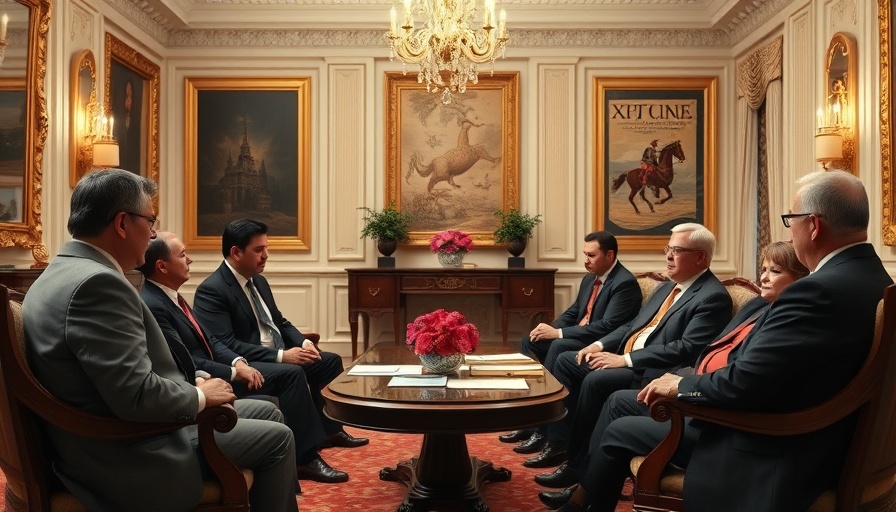
Understanding the Dynamics of the Oval Office
In recent times, the Oval Office has become a stage for international diplomacy, where leaders from around the globe engage in a high-stakes dance of power, persuasion, and sometimes provocation. Such was the case during the recent meeting between South Africa's President Cyril Ramaphosa and U.S. President Donald Trump. Their encounter was marked not just by a diplomatic exchange but a theatrical performance that revealed deeper implications for international relations as both leaders navigated this charged moment.
A Choreographed Encounter
What many did not anticipate was the sequence of events that would unfold after a relatively calm start to their meeting. As discussions evolved, Trump faced a press question regarding South Africa’s controversial land reform policies and allegations of "white genocide." In a move reminiscent of previous confrontations with foreign leaders, Trump prepared a video presentation, complete with dimmed lights, showcasing polarizing images related to the topic. This direct challenge not only shifted the dynamics of their discussion but also put Ramaphosa in a defensive position, highlighting the often theatrical nature of modern diplomacy.
The Role of Media in Diplomacy
In today’s global landscape, media plays a critical role in shaping public perception, especially surrounding sensitive topics like racial issues and land reform. Trump's approach—parading questionable footage and news clippings while engaging the media—highlighted not just his strategy but the inherent risks of political theater. Ramaphosa's composed response, emphasizing the importance of listening to South Africans, provided a counter-narrative aimed at framing the conversation back toward constructive dialogue rather than sensationalist claims.
Why This Matters: Global Implications
This particular encounter has far-reaching consequences that go beyond South Africa and the U.S. It underscores how diplomatic meetings can be manipulated for media spectacle, potentially impacting bilateral relations and domestic politics back home. As the world watches, the manner in which leaders interact—including confrontations and responses—can set the tone for their respective nations’ engagements on the global stage.
Revisiting Historical Context
The political rhetoric around land reform in South Africa is rooted in a complex history. After the end of apartheid, the question of land ownership became a contentious issue as many black South Africans sought redress for historical injustices. The controversial land seizure bill, signed by Ramaphosa, represents not just a domestic policy shift but also a significant international talking point that touches on issues of race and inequality. Trump's insistence on framing this within the narrative of "white genocide" seeks to polarize an already delicate topic, risking further division.
Decoding Trump's Methodology
Trump's approach seems to echo his previous meetings with foreign leaders, where he often resorts to dramatic presentations to bolster his points. This tactic is not new; it aims to capture media attention and rally public sentiment. However, it also raises questions about the efficacy of such an approach in genuine diplomatic discussions. Is the spectacle serving to inform or mislead? The implications of such methods in diplomacy can be as critical as the outcomes achieved from these meetings.
Judging the Response: The Resilience of Ramaphosa
How did Ramaphosa manage this tense encounter? His calm demeanor amidst a barrage of accusations showcased not only his political acumen but also the strength of character required to navigate such a public forum. Onlookers, including tech billionaire Elon Musk, observed a leader balancing both the expectations of his domestic audience and the pressures exerted by an unpredictable U.S. president. This interaction serves as a case study for how leaders can maintain composure under pressure, a vital skill for effectively handling international discourse.
Moving Forward: Actions and Reactions
The fallout from this meeting will require careful navigation from both leadership teams. As international relations become increasingly scrutinized through the lens of social media and global news, the actions that follow could reshape perceptions and policies on either side. For Ramaphosa, continuing to frame the conversation around inclusive dialogue and addressing domestic concerns will be crucial, while Trump might perceive this as an opportunity to solidify his narrative among his constituents.
Final Thoughts: What This Means for World News Coverage
This incident is not just a reflection of two leaders' interactions but a broader commentary on how world news today is produced and consumed. With rising tensions in international relations and the prevalence of sensationalist reporting, audiences must discern between reality and theatrics. Engaging critically with world news coverage can empower citizens to better understand the complexities of global issues.
As the news cycle continues to evolve, staying informed and critically analyzing these encounters will become essential for understanding the implications that carry across borders. Transformation in global politics may often hinge upon seemingly small moments like these—moments that are shaped and amplified in the media.
 Add Row
Add Row  Add
Add 




 Add Row
Add Row  Add
Add 

Write A Comment